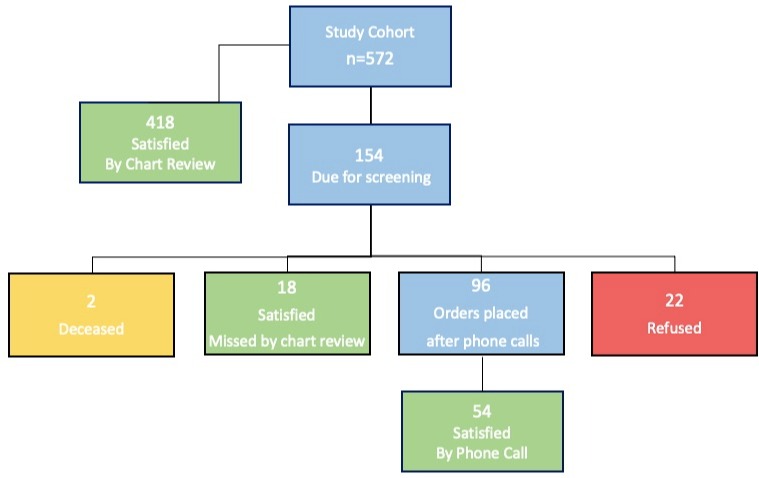Back
Poster Session E - Tuesday Afternoon
E0170 - Increasing Colon Cancer Screening Compliance in a Residency Clinic by Means of Personalized Patient Phone Calls
Tuesday, October 25, 2022
3:00 PM – 5:00 PM ET
Location: Crown Ballroom

Aimen Farooq, MD
AdventHealth Orlando
Lake Mary, FL
Presenting Author(s)
Aimen Farooq, MD, Baha Aldeen Bani Fawwaz, MBBS, Rima Shobar, MD, Bayarmaa Mandzhieva, MD, Anum Jalil, MD, Arooj Mian, MD, Rafael Itzkowitz, DO, Manoucher Manoucheri, MD
AdventHealth Orlando, Orlando, FL
Introduction: Colorectal cancer (CRC) ranks second as a cause of cancer mortality and is the third most prevalent cancer in both men and women in the US. CRC screening efforts are directed towards the detection and removal of adenomas and sessile serrated lesions (SSLs), which reduces CRC incidence and CRC mortality significantly. In our Internal Medicine clinic at a tertiary care hospital, a deficient colorectal cancer screening compliance rate was identified in 2019. We performed individual patient calls to increase the screening rates and evaluated the efficacy of these interventions.
Methods: We screened patients aged 50-75 in our clinic. Patient due for CRC screening was defined as having had their screening colonoscopy more than 10 years ago or stool-DNA test more than 3 years ago with normal results. Patients with a history of colon cancer or familial cancer syndromes were excluded. For the next year, patients due for screening were called by resident physicians to provide counseling regarding different screening options and the risks and benefits of each test. If the patient agreed, a stool test or a referral to a gastroenterologist was ordered. We hypothesized that if patients underwent a screening test within 1 year after the phone calls, it was because of the interventions.
Results: A total of 572 patients were eligible for the study. 418 patients were satisfied with screening at the start. 154 patients due for CRC screening were called, 18 patients responded to have received screening on time from other facilities; hence satisfied and 2 patients were deceased at the time of intervention. Out of 134 patients eligible for screening, 96 agreed to undergo a screening colonoscopy after the discussion, 22 patients refused screening and 16 patients were unable to be contacted via phone. Among 96 patients who agreed to screen, 54 received screening for CRC within a year of the intervention. Phone call intervention revealed a 45.7% (54/134-16) response rate. The baseline CRC screening compliance before interventions was 76.2% (418+18/572), and post-intervention compliance rate was 85.6% (418+18+54/572).
Discussion: A phone call intervention increased colorectal cancer screening compliance by 9.4% in our cohort. We concluded that internal medicine clinics can play an active part in CRC prevention by counseling patients during regular wellness visits, sending reminder letters and/or phone calls to eligible patients.

Disclosures:
Aimen Farooq, MD, Baha Aldeen Bani Fawwaz, MBBS, Rima Shobar, MD, Bayarmaa Mandzhieva, MD, Anum Jalil, MD, Arooj Mian, MD, Rafael Itzkowitz, DO, Manoucher Manoucheri, MD. E0170 - Increasing Colon Cancer Screening Compliance in a Residency Clinic by Means of Personalized Patient Phone Calls, ACG 2022 Annual Scientific Meeting Abstracts. Charlotte, NC: American College of Gastroenterology.
AdventHealth Orlando, Orlando, FL
Introduction: Colorectal cancer (CRC) ranks second as a cause of cancer mortality and is the third most prevalent cancer in both men and women in the US. CRC screening efforts are directed towards the detection and removal of adenomas and sessile serrated lesions (SSLs), which reduces CRC incidence and CRC mortality significantly. In our Internal Medicine clinic at a tertiary care hospital, a deficient colorectal cancer screening compliance rate was identified in 2019. We performed individual patient calls to increase the screening rates and evaluated the efficacy of these interventions.
Methods: We screened patients aged 50-75 in our clinic. Patient due for CRC screening was defined as having had their screening colonoscopy more than 10 years ago or stool-DNA test more than 3 years ago with normal results. Patients with a history of colon cancer or familial cancer syndromes were excluded. For the next year, patients due for screening were called by resident physicians to provide counseling regarding different screening options and the risks and benefits of each test. If the patient agreed, a stool test or a referral to a gastroenterologist was ordered. We hypothesized that if patients underwent a screening test within 1 year after the phone calls, it was because of the interventions.
Results: A total of 572 patients were eligible for the study. 418 patients were satisfied with screening at the start. 154 patients due for CRC screening were called, 18 patients responded to have received screening on time from other facilities; hence satisfied and 2 patients were deceased at the time of intervention. Out of 134 patients eligible for screening, 96 agreed to undergo a screening colonoscopy after the discussion, 22 patients refused screening and 16 patients were unable to be contacted via phone. Among 96 patients who agreed to screen, 54 received screening for CRC within a year of the intervention. Phone call intervention revealed a 45.7% (54/134-16) response rate. The baseline CRC screening compliance before interventions was 76.2% (418+18/572), and post-intervention compliance rate was 85.6% (418+18+54/572).
Discussion: A phone call intervention increased colorectal cancer screening compliance by 9.4% in our cohort. We concluded that internal medicine clinics can play an active part in CRC prevention by counseling patients during regular wellness visits, sending reminder letters and/or phone calls to eligible patients.

Figure: Figure 1: Process Flowchart
Disclosures:
Aimen Farooq indicated no relevant financial relationships.
Baha Aldeen Bani Fawwaz indicated no relevant financial relationships.
Rima Shobar indicated no relevant financial relationships.
Bayarmaa Mandzhieva indicated no relevant financial relationships.
Anum Jalil indicated no relevant financial relationships.
Arooj Mian indicated no relevant financial relationships.
Rafael Itzkowitz indicated no relevant financial relationships.
Manoucher Manoucheri indicated no relevant financial relationships.
Aimen Farooq, MD, Baha Aldeen Bani Fawwaz, MBBS, Rima Shobar, MD, Bayarmaa Mandzhieva, MD, Anum Jalil, MD, Arooj Mian, MD, Rafael Itzkowitz, DO, Manoucher Manoucheri, MD. E0170 - Increasing Colon Cancer Screening Compliance in a Residency Clinic by Means of Personalized Patient Phone Calls, ACG 2022 Annual Scientific Meeting Abstracts. Charlotte, NC: American College of Gastroenterology.
